Landing a job as a cabin crew member is no easy feat, and getting a position with one of the world’s leading airlines is even more difficult.
But budding cabin crew have a great chance to get hired with Etihad, the national airline of the UAE and the world’s third-safest airline, as it expands its recruitment campaign.
The airline announced that it is hiring candidates from all over the world in January, with open days in Abu Dhabi and cities throughout Europe and Asia.
With travel on the up and the airline bringing back its A380 superjumbos, there are plenty of positions up for grabs, and crew are being hired in destinations such as the Philippines, Slovenia, Japan, Brazil and more.
If you love flying, are passionate about seeing the world and are considering applying, here is some inside information from captain Jihad Matta, head of crew performance and support at Etihad Airways, on exactly what the airline is looking for when bolstering its flying squad.
Why is Etihad holding recruitment days now?
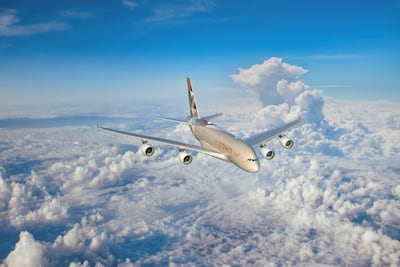
According to captain Jihad, the latest recruitment drive builds on Etihad's hiring plans that started in 2021.
"We’ve actually been hiring since October 2021. In those days the world was still kind of closed, but our gut feeling was that when the world opens up, people will want to travel. When we saw an increase in travel and demand, we increased our flights and therefore the number of crew we hired and I think we ended up last year with just over an additional 1,000 crew.
"We’ve not seen that demand fade and the airline is now going through a period of growth. We added aircraft last year and we plan to add quite a lot this year, so we’re continuing on that and at least for the next six to eight months, we're actively hiring pilots, cabin crew and for other parts of the business as well."
Who can apply to Etihad's cabin crew positions?
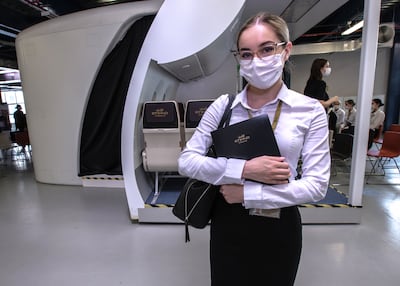
Anyone interested in becoming a crew member must fulfil a few requirements before applying.
These include being fluent in English, having graduated high school, and having no tattoos that would be visible when wearing crew uniform.
People with previous flying experience are encouraged to apply, as are those who have worked in hospitality.
"Us and hospitality work hand in hand," captain Jihad said.
"A lot of crew might join hotels after they stop flying because they have that experience of customer relations and the same goes when we look at somebody who's worked in a hotel or theme park, they have that knowledge of customer service."
Other than that, potential cabin crew simply need to be passionate about the job.
"We want want somebody who loves flying and is passionate about it. You must be an outgoing person who loves to travel and definitely loves people. If you have all of those qualities and you can communicate well, then we've got a winning combination in a new recruit."
Do applicants need to be a certain height, age or look a certain way to be hired?
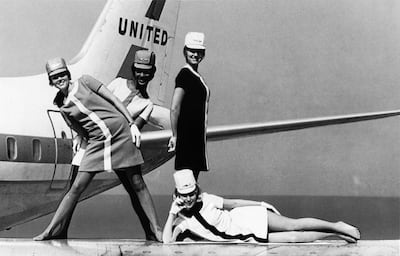
Not too long ago, cabin crew had to adhere to very strict standards regarding to height, weight and appearance and while things have evolved over the years with many airlines relaxing some of these ideals, rules still exist for cabin crew.
At Etihad, applicants need to meet the height and weight requirements set by the General Civil Aviation Authority in the UAE. This states that applicants should be 165cm tall.
However, if you’re a a centimetre out, don't let it stop you applying. “It’s something that we look at it in the interviews. The reason being that, some people might have longer arms despite being shorter. Some people might be taller, but actually their arms are short."
When it comes to age, applicants need to be at least 21, another standard set by the GCAA. On the other side of the spectrum, there’s no official upper age limit, but for applicants without flying experience, it's a case of the younger the better.
“The reality is that flying takes its toll on your body. Being younger definitely comes with that stamina to keep you going more than somebody older who has never tried it before. We would look at age versus experience to make a decision.”
All nationalities are welcome, provided applicants are fluent in English. Etihad currently employs 98 nationalities, something that it's very proud of and is keen to boost that to 100 in the coming year.
What to expect at Etihad's assessment days?
Applicants whose CVs meets Etihad’s expectations will be invited to attend an assessment day. In Abu Dhabi this will take place on January 17, with resumés being accepted on January 16.
Such assessment days consist of several activities, including an introduction to the airline from Etihad staff followed by a short informal conversation with some of the recruitment team, designed to see how applicants express themselves and communicate.
Then there's a group task which lasts about half an hour and where recruiters are looking to see applicants interact with others, use problem-solving skills, take criticism, etc.
Finally, there's a panel interview which typically takes about 45 minutes. There won’t be any technical questions about aircraft or aviation or advanced medical questions, so there is no need to try to cram for the interview the day before. However, it is a good plan to have researched the airline and the role.
What should attendees wear to Etihad’s cabin crew open day?
If invited to attend one of the assessment days, candidates are given guidance on what to wear.
For women, formal business attire, such as tailored trousers or a skirt and a shirt are recommended, with a suit jacket being a nice addition. Heels are the preferred choice for footwear and hair should be neatly tied back.
Men should wear a suit, or a smart pair of trousers, shirt and jacket with black formal footwear. They should also have a clean-shaven look.
Should applicants ask questions?
Preparing questions to ask the recruitment team during the interview is a good tip. As much as this is Etihad’s chance to ask you questions, it’s also a chance to find out more about the job.
“I always say to the recruitment team be as transparent and as open as possible. If somebody has a doubt or a question, tell them the reality.
"After all, this is not just fun, walk in the park, easy job. You will have challenges such as sleeping at night when your body doesn't want to sleep, or flying during the night. There will be different types of passengers to handle with diversions, medical issues, etc. We give out as much information as possible to prepare applicants for the reality of what's to come."
Will new recruits get to fly Etihad’s A380 superjumbos?
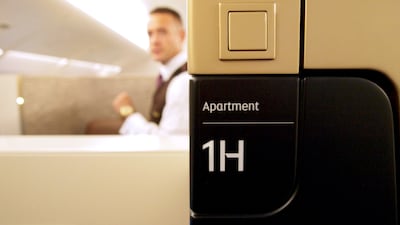
Etihad recently announced that it is bringing back its A380 superjumbos, the world’s largest commercial passenger jets. This has caused a flurry of excitement in the aviation world ― and in Etihad’s headquarters.
For captain Jihad, it’s a very special time. "The A380 is very dear to me personally, I'm an A380 pilot and I will hopefully be going to get our first aircraft back next month. But for crew, and guests alike, everyone loves it."
That said, newly qualified candidates will have to bide their time before they can expect to fly on the jets.
"We will not hire externally and put crew on the A380, we will keep it with our senior crew who flew on it before. But with time we will train as many people as we can on all the different aircraft types."
Can you share an insider tip for applicants?
For captain Jihad the most important thing for candidates on assessment day is to not try to be someone they are not.
“Be yourself. Be yourself and enjoy it. At the end of the day, whether you pass or fail, it's a learning experience. If you don't make it, you will get feedback from our team on why you didn't make it so you can learn from it. And if you make it and pass, fantastic.”
If successful, how long will it take until new crew are flying?
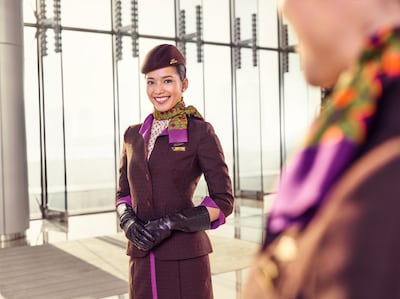
The onboarding process takes about two to three weeks for Etihad to complete medical checks, security clearances and other paperwork.
Initial flight crew training takes 42 days, during which crew will learn about the aircraft, safety measures, firefighting and emergency procedures and lots more.
Once that’s done, recruits fly on a few supernumerary flights, putting what they've learnt into practice but without being considered part of the operating crew. For the next three months, they will work on flights as inexperienced cabin crew members, progressing to fully qualified cabin crew after this period.
What perks do Etihad Airways offer cabin crew?
In addition to a monthly salary, provided housing and discounted travel, cabin crew have the chance to fly all over the world.
While layovers today are not as extensive as they were years ago thanks to the frequency of flights to many destinations, the job still gives world travellers the chance to fulfil their passion.
"No two days are the same, if you don't like routine it's great. After a few months you start finding your favourite places to fly to, knowing what to do, where to go. After about a year, you really settle in because you will have figured out how to bid for flights, how things work, how you can use your days off, how you can use our amazing staff travel benefits."
Scroll through the gallery below for pictures from Etihad Airways's crew training centre





























